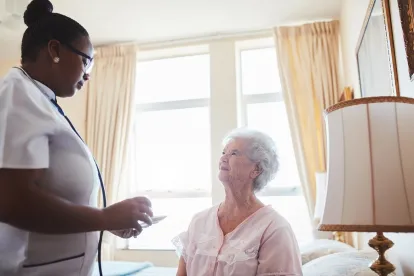COVID-19 has hit long-term care facilities very hard. Every day brings reports of lethal outbreaks in such facilities and one-quarter or more of the reported COVID-19 related deaths in the United States have been connected to long-term care facilities.
Given what is known about the Coronavirus, perhaps that result should not be surprising. Long-term care facilities have many elderly residents living in close proximity to each other and a good number of residents have co-morbidities, behavioral health or cognitive impairments, or other health risk factors that make them particularly vulnerable to both infection and developing serious morbidity or mortality from the virus. The virus has not discriminated amongst facilities and has caused serious issues in facilities that have had a history of high quality care with limited reported deficiencies as well as facilities that have experienced survey issues. Public and private operated facilities have been affected, as have those serving predominantly well-off and less well-off populations.
The potential for lawsuits and liability for long-term care facilities is always present; challenges at securing adequate insurance coverage has been a real concern to the industry for decades, particularly in states with aggressive plaintiffs’ bars, like Florida. Even before the height of the pandemic, the Department of Justice had indicated that skilled nursing facilities will be a target area under the False Claims Act in 2020, and announced a renewed focus on the quality of care provided in such facilities. The COVID-19 era brings a host of new challenges and increasing risks to patients and provides alike.
Immunity for COVID-19 activities has received attention from Federal lawmakers. As described previously, the Federal Public Readiness and Emergency Preparedness Act put in place some protections, and the CARES Act limits state and federal liability for volunteer health care professionals.
A number of states have considered and some have enacted immunity protections for health care providers, including long-term care facilities. However, with all grants of immunity, these waivers protect providers by removing the rights of residents and their families to obtain redress for certain occurrences, and patient advocates have voiced concern that immunity may shield negligent actors from rightful discipline. Moreover, some patient advocates argue that immunity may remove the incentive for long-term care facilities to take preventative measures, including employee testing and ensuring sufficient supply of personal protective equipment. Nevertheless, while there may be challenges to the effectiveness of waivers that eliminate causes of action, liability waivers have been a way to recognize the challenges presented to such facilities by COVID-19, including shortages of health care staff and equipment, and waivers encourage such facilities to continue providing services in circumstances where problems are difficult to avoid.
At least six states have enacted liability waivers applicable to long-term care facilities and the conditions of immunity are largely similar. These waivers typically grant immunity from liability to facilities 1) providing care pursuant to the COVID-19 pandemic, 2) in good faith, 3) during the period of the COVID-19 state of emergency, and 4) absent willful misconduct and gross negligence. However, the waivers differ with regard to which facilities are included or excluded from the waivers, whether facilities are shielded from civil and criminal liability, and the standards of conduct that are not immune.
In effect, the COVID-19 waivers will not protect facilities from conduct occurring prior to the COVID-19 pandemic or from deficiencies that began prior to the pandemic but continued after a state of emergency was declared. A pre-existing lack of sufficient personnel or equipment may be an example of conduct to which such waivers would not apply. Additionally, state waivers may not block action under federal law, including the False Claims Act.
Arizona
Executive Order 2020-27 shields nursing care institutions and assisted living facilities from civil liability when providing care in support of the state’s COVID-19 public health emergency declaration and acting in good faith. However, the Executive Order does not extend to actions that constitute gross negligence or reckless or willful misconduct. Additionally, the Executive Order indicates that provision of care by a health care professional, volunteer or other individual, while under the influence of alcohol or intoxicating drugs would not be subject to immunity.
Connecticut
The Connecticut governor granted immunity from civil liability to health care facilities, including nursing homes, pursuant to Executive Order 7U. Health care facilities professionals are immune from liability only if they acted in good faith and without malice, gross negligence, or willful misconduct, and the actions would not otherwise constitute a crime, fraud or a false claim. The Executive Order indicates that immunity includes “acts or omissions undertaken because of a lack of resources, attributable to the COVID-19 pandemic, that renders the health care professional or health care facility unable to provide the level or manner of care that otherwise would have been required . . .” The waiver shields facilities from actions taking place during the COVID-19 public health emergency (beginning March 10, 2020).
Illinois
Executive Order 2020-19 grants nursing homes and skilled and intermediate long-term care facilities immunity from civil liability “for any injury or death alleged to have been caused by any act or omission by the Health Care Facility, which injury or death occurred at a time when [the] Health Care Facility was engaged in the course of rendering assistance to the State by providing health care services in response to the COVID-19 outbreak.” The language of the Executive Order is potentially broad and could shield long-term care facilities from liability for injuries or deaths unrelated to COVID-19 patient care so long as the facility was providing some amount of service in response to COVID-19. It is not clear how the language “rendering assistance to the State” will be interpreted. This Executive Order does not extend immunity to injuries or deaths caused by gross negligence or willful misconduct.
Massachusetts
Massachusetts passed legislation protecting health care professionals and health care facilities, including skilled nursing facilities and assisted living residences, from civil liability during the COVID-19 pandemic. These protections extend to providers, including providers licensed by the board of nursing home administrators and health care facility administrators, including executives, board members, or supervisors responsible for directing the facility or its personnel. However, providers and facilities are immune from liability only during the period of the COVID-19 pandemic (beginning March 10, 2020) when “providing care or treatment of [an] individual was impacted by the health care facility’s or health care professional’s decisions or activities in response to treatment conditions resulting from the COVID-19 outbreak or COVID-19 emergency rules.” Immunity does not apply to actions caused by gross negligence, recklessness or conduct with an intent to harm or discriminate.
Michigan
As discussed previously, Executive Order 2020-30 grants nursing homes and homes for the aged that provide medical services in support of the state’s COVID-19 response immunity from liability for “an injury sustained by a person by reason of those services regardless of how or under what circumstances or by what cause those injuries are sustained . . . ” This immunity does not extend to acts that constitute willful or gross negligence.
New Jersey
Executive Order 112 grants long-term care and skilled nursing facilities immunity from civil liability for acts or omissions in support of the state’s COVID-19 response when undertaken in good faith by employees, agents, or officers. Immunity does not extend to acts that constitute a crime, actual fraud, actual malice, gross negligence, or willful misconduct.
New York
The Emergency or Disaster Treatment Protection Act grants nursing homes immunity from civil and criminal liability when arranging for or providing care pursuant to a COVID-19 emergency rule and acting in good faith. The Act shields facilities from liability when “treatment of [an] individual is impacted by the health care facility’s or health care professional’s decisions or activities in response to or as a result of the COVID-19 outbreak and in support of the state’s directives.” Immunity does not apply to acts that constitute willful or intentional criminal misconduct, gross negligence, reckless misconduct or intentional infliction of harm.
As the COVID-19 pandemic continues to take a toll on long-term care facilities, the issue of liability waivers is gaining increasing attention and health care industry groups are asking governors and state lawmakers to grant immunity to nursing homes and long-term care facilities. For instance, a trade group representing approximately 700 Florida nursing homes requested immunity from Florida Governor Ron DeSantis, and a conglomerate of California health care trade associations including the California Assisted Living Association similarly requested immunity from Governor Gavin Newsom.
It is likely that each of the above-referenced waivers will lead to litigation as interpretations will differ on key terms and applicability to specific situations, but the waivers provide important defenses for long-term care facilities providing critical care to a vulnerable population in the pandemic crisis.





 />i
/>i
